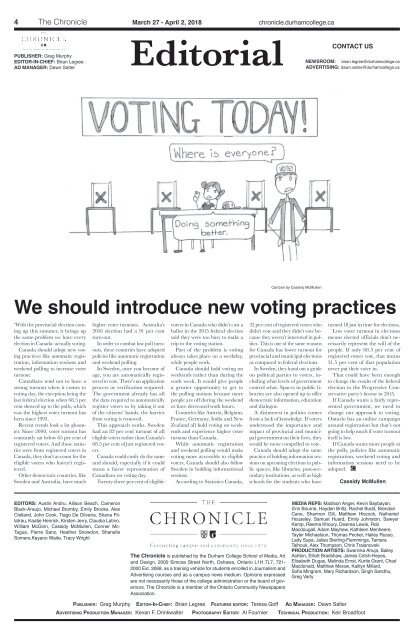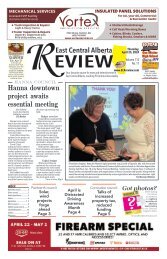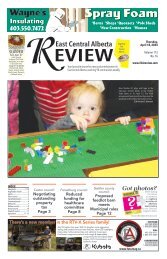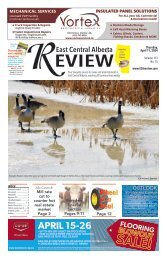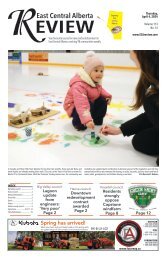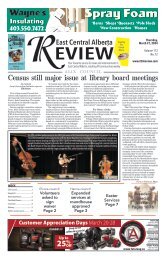You also want an ePaper? Increase the reach of your titles
YUMPU automatically turns print PDFs into web optimized ePapers that Google loves.
4 The <strong>Chronicle</strong> March 27 - April 2, 20<strong>18</strong> chronicle.durhamcollege.ca<br />
PUBLISHER: Greg Murphy<br />
EDITOR-IN-CHIEF: Brian Legree<br />
AD MANAGER: Dawn Salter<br />
Editorial<br />
CONTACT US<br />
NEWSROOM: brian.legree@durhamcollege.ca<br />
ADVERTISING: dawn.salter@durhamcollege.ca<br />
‘With the provincial election coming<br />
up this summer, it brings up<br />
the same problem we have every<br />
election in Canada: actually voting.<br />
Canada should adopt new voting<br />
practices like automatic registration,<br />
information sessions and<br />
weekend polling to increase voter<br />
turnout.<br />
Canadians tend not to have a<br />
strong turnout when it comes to<br />
voting day, the exception being the<br />
last federal election when 68.5 per<br />
cent showed up to the polls, which<br />
was the highest voter turnout has<br />
been since 1993.<br />
Recent trends look a lot gloomier.<br />
Since 2000, voter turnout has<br />
constantly sat below 65 per cent of<br />
registered voters. And those statistics<br />
were from registered voters in<br />
Canada, they don’t account for the<br />
eligible voters who haven’t registered.<br />
Other democratic countries, like<br />
Sweden and Australia, have much<br />
higher voter turnouts. Australia’s<br />
2016 election had a 91 per cent<br />
turn-out.<br />
In order to combat low poll turnouts,<br />
these countries have adopted<br />
policies like automatic registration<br />
and weekend polling.<br />
In Sweden, once you become of<br />
age, you are automatically registered<br />
to vote. There’s no application<br />
process or verification required.<br />
The government already has all<br />
the data required to automatically<br />
register voters so by taking it out<br />
of the citizens’ hands, the barrier<br />
from voting is removed.<br />
This approach works. Sweden<br />
had an 82 per cent turnout of all<br />
eligible voters rather than Canada’s<br />
68.5 per cent of just registered voters.<br />
Canada could easily do the same<br />
and should, especially if it could<br />
mean a fairer representation of<br />
Canadians on voting day.<br />
Twenty-three per cent of eligible<br />
voters in Canada who didn’t cast a<br />
ballot in the 2015 federal election<br />
said they were too busy to make a<br />
trip to the voting station.<br />
Part of the problem is voting<br />
always takes place on a weekday,<br />
while people work.<br />
Canada should hold voting on<br />
weekends rather than during the<br />
work week. It would give people<br />
a greater opportunity to get to<br />
the polling stations because more<br />
people are off during the weekend<br />
or have decreased work hours.<br />
Countries like Austria, Belgium,<br />
France, Germany, India and New<br />
Zealand all hold voting on weekends<br />
and experience higher voter<br />
turnout than Canada.<br />
While automatic registration<br />
and weekend polling would make<br />
voting more accessible to eligible<br />
voters, Canada should also follow<br />
Sweden in holding informational<br />
sessions.<br />
According to Statistics Canada,<br />
Cartoon by Cassidy McMullen<br />
We should introduce new voting practices<br />
32 per cent of registered voters who<br />
didn’t vote said they didn’t vote because<br />
they weren’t interested in politics.<br />
This is one of the same reasons<br />
for Canada has lower turnout for<br />
provincial and municipal elections<br />
as compared to federal elections.<br />
In Sweden, they hand out a guide<br />
on political parties to voters, including<br />
what levels of government<br />
control what. Spaces in public libraries<br />
are also opened up to offer<br />
democratic information, education<br />
and dialogue.<br />
A disinterest in politics comes<br />
from a lack of knowledge. If voters<br />
understood the importance and<br />
impact of provincial and municipal<br />
government on their lives, they<br />
would be more compelled to vote.<br />
Canada should adopt the same<br />
practice of holding information sessions<br />
on upcoming elections in public<br />
spaces, like libraries, post-secondary<br />
institutions, as well as high<br />
schools for the students who have<br />
turned <strong>18</strong> just in time for elections.<br />
Low voter turnout in elections<br />
means elected officials don’t necessarily<br />
represent the will of the<br />
people. If only 68.5 per cent of<br />
registered voters vote, that means<br />
31.5 per cent of that population<br />
never put their voice in.<br />
That could have been enough<br />
to change the results of the federal<br />
election to the Progressive Conservative<br />
party’s favour in 2015.<br />
If Canada wants a fairly represented<br />
government, we need to<br />
change our approach to voting.<br />
Ontario has an online campaign<br />
around registration but that’s not<br />
going to help much if voter turnout<br />
itself is low.<br />
If Canada wants more people at<br />
the polls, policies like automatic<br />
registration, weekend voting and<br />
information sessions need to be<br />
adopted.<br />
Cassidy McMullen<br />
EDITORS: Austin Andru, Allison Beach, Cameron<br />
Black-Araujo, Michael Bromby, Emily Brooks, Alex<br />
Clelland, John Cook, Tiago De Oliveira, Shana Fillatrau,<br />
Kaatje Henrick, Kirsten Jerry, Claudia Latino,<br />
William McGinn, Cassidy McMullen, Conner Mc-<br />
Tague, Pierre Sanz, Heather Snowdon, Shanelle<br />
Somers,Kayano Waite, Tracy Wright<br />
The <strong>Chronicle</strong> is published by the Durham College School of Media, Art<br />
and Design, 2000 Simcoe Street North, Oshawa, Ontario L1H 7L7, 721-<br />
2000 Ext. 3068, as a training vehicle for students enrolled in Journalism and<br />
Advertising courses and as a campus news medium. Opinions expressed<br />
are not necessarily those of the college administration or the board of governors.<br />
The <strong>Chronicle</strong> is a member of the Ontario Community Newspapers<br />
Association.<br />
MEDIA REPS: Madison Anger, Kevin Baybayan,<br />
Erin Bourne, Hayden Briltz, Rachel Budd, Brendan<br />
Cane, Shannon Gill, Matthew Hiscock, Nathaniel<br />
Houseley, Samuel Huard, Emily Johnston, Sawyer<br />
Kemp, Reema Khoury, Desirea Lewis, Rob<br />
Macdougall, Adam Mayhew, Kathleen Menheere,<br />
Tayler Michaelson, Thomas Pecker, Hailey Russo,<br />
Lady Supa, Jalisa Sterling-Flemmings, Tamara<br />
Talhouk, Alex Thompson, Chris Traianovski<br />
PRODUCTION ARTISTS: Swarnika Ahuja, Bailey<br />
Ashton, Elliott Bradshaw, James Critch-Heyes,<br />
Elisabeth Dugas, Melinda Ernst, Kurtis Grant, Chad<br />
Macdonald, Matthew Meraw, Kaitlyn Millard,<br />
Sofia Mingram, Mary Richardson, Singh Sandhu,<br />
Greg Varty<br />
Publisher: Greg Murphy Editor-In-Chief: Brian Legree Features editor: Teresa Goff Ad Manager: Dawn Salter<br />
Advertising Production Manager: Kevan F. Drinkwalter Photography Editor: Al Fournier Technical Production: Keir Broadfoot


